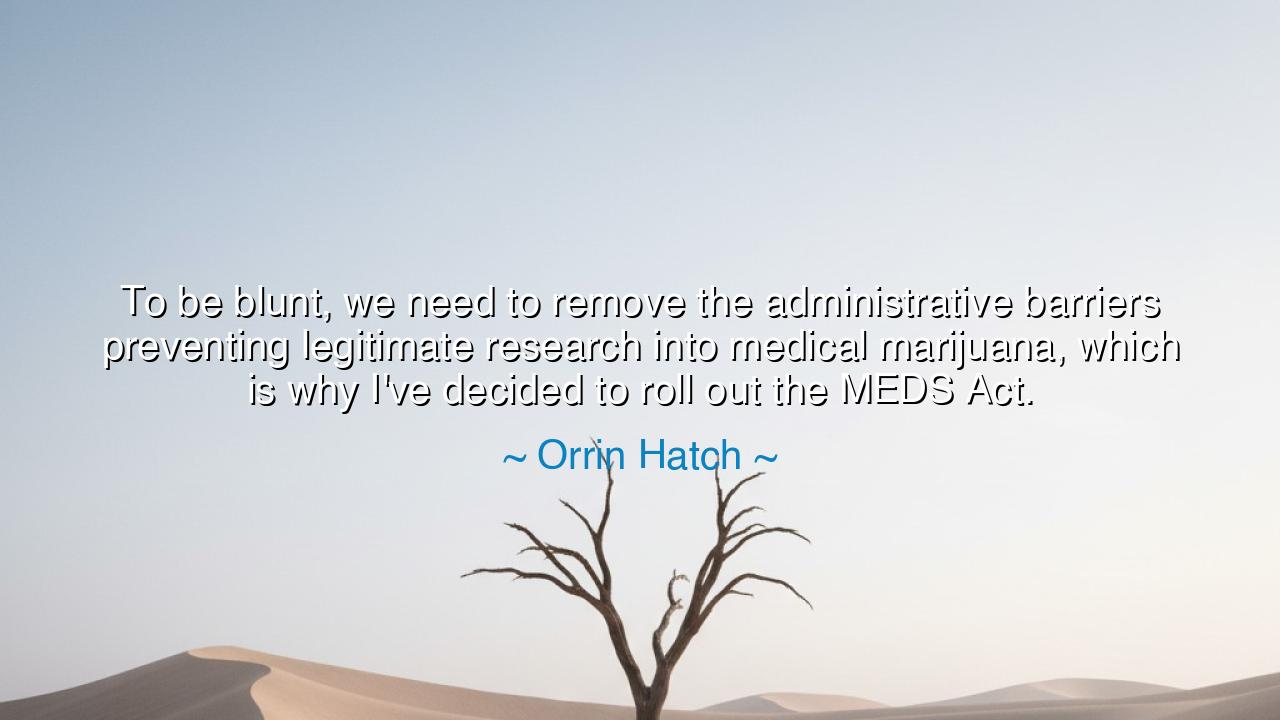
To be blunt, we need to remove the administrative barriers
To be blunt, we need to remove the administrative barriers preventing legitimate research into medical marijuana, which is why I've decided to roll out the MEDS Act.






Hear the voice of Orrin Hatch, elder statesman, who spoke with clarity and conviction: “To be blunt, we need to remove the administrative barriers preventing legitimate research into medical marijuana, which is why I've decided to roll out the MEDS Act.” These words, though uttered in the chambers of politics, carry the weight of wisdom and compassion. For they are not about indulgence, but about the pursuit of truth, healing, and justice. He calls not for recklessness, but for the breaking of chains that bind knowledge, so that suffering people may find relief where once only silence and stigma prevailed.
The meaning is straightforward yet profound. Hatch recognized that science cannot flourish in chains. When administrative barriers block honest inquiry, ignorance prevails, and those who suffer remain bound in pain. His call was not to embrace marijuana blindly, but to grant researchers the freedom to study it fully, to separate fact from fear, and to allow the light of evidence to dispel the shadows of prejudice. He understood that the MEDS Act was not only a law, but a gesture of faith in the power of truth and the duty of society to care for its weakest.
History shows us the danger of forbidding inquiry. In the age of Galileo, when the heavens themselves were declared off-limits to honest study, humanity stumbled in darkness, bound by dogma. Only when the barriers were broken did we glimpse the true order of the stars. So too, in the realm of medicine, there have been cures delayed, discoveries dismissed, simply because law and fear stood in the way. Hatch’s words remind us that compassion must walk hand in hand with science, for without compassion, truth is silenced, and without truth, compassion is powerless.
Consider the suffering of the ill—those with epilepsy, chronic pain, or cancer—who have turned in desperation to medical marijuana. For many, it brought relief when no other medicine could. Yet their path was hindered, their physicians uncertain, because research was shackled by law. Hatch, a man long known for his conservatism, saw the contradiction: to deny the suffering the chance of healing was to betray the very purpose of law, which is to serve the people. Thus his call was not of ideology, but of humanity.
The origin of his decision lies in this confrontation between tradition and need. For decades, marijuana was treated only as a vice, its potential for healing ignored. But as stories emerged of children freed from seizures, of the dying comforted in their last days, the truth pressed harder and harder against its chains. Hatch, in his wisdom, chose to heed the voice of compassion and to clear the way for legitimate research. His words mark a turning point, when even those once opposed began to see that mercy must triumph over fear.
The lesson, child of tomorrow, is this: never let barriers of ignorance stand between truth and compassion. Laws are made for man, not man for laws. If rules prevent the healing of the sick or the discovery of knowledge, then the rules must be changed. Respect tradition, but do not let it become a cage. True wisdom lies in courage: the courage to challenge what is broken, the courage to open the way for discovery, the courage to place mercy above prejudice.
To live by this wisdom, support the pursuit of knowledge wherever it leads. Demand honesty in research, integrity in governance, and compassion in policy. Do not fear inquiry, for truth does not threaten a just society—it strengthens it. And when you see suffering, ask not whether tradition forbids relief, but whether humanity requires it. For in that question lies the true measure of justice.
Thus the words of Orrin Hatch endure: “We need to remove the administrative barriers preventing legitimate research.” They remind us that compassion and truth must not be shackled, that healing must not be delayed by fear, and that the greatest act of law is not control, but liberation. May these words guide future generations to honor both science and mercy, so that no voice of suffering goes unheard, and no path to healing remains closed.






AAdministratorAdministrator
Welcome, honored guests. Please leave a comment, we will respond soon